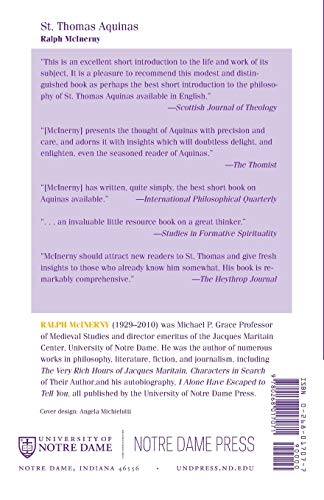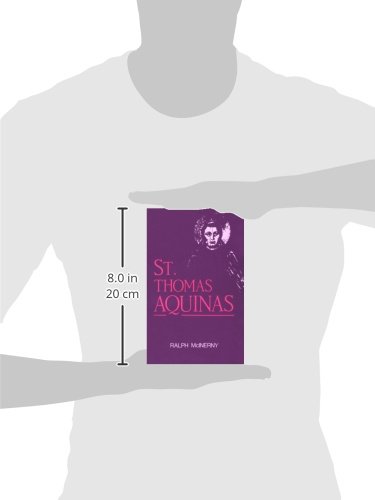Customer Services
Copyright © 2025 Desertcart Holdings Limited




Full description not available
J**E
Solid work
Ralph McInerny's St. Thomas Aquinas as it was required reading for a philosophy class. My overall impression of the work was that it is a solid piece. It's emphasis tends toward introducing the reader to St. Thomas's philosophical viewpoint, though there is some biographical info as well. That, of course, is an important point. Readers looking for a devotional, or rather hagiographical, account of St. Thomas's life will be disapointed to some degree. Those looking to enter into the philosophical, and to some degree theological, world of St. Thomas, however, will be given a fair introduction.That "fair introduction" should be understood to include some of the dense writing of St. Thomas, followed by dense commentary by Ralph McInerny. This means that the book is not always a smooth read. So, the casual reader may get discouraged during certain parts of the book. To that I would say, don't give up. Part of the difficulty to the modern reader is that, while we tend to be well educated, we are devoid of any real foundation in Aristotelian logic. Hence, our minds, as such, are not pre-disposed to systematic logic and intellectual proofs. But, for those who are looking to deepen their minds in this arena, this isn't a bad place to start.Lastly, I think it important to note that although I am not new to Aquinas, I am a beginning philosophy student and many of the deeper philosophical concepts of Aquinas are new to me. So, take that into consideration when reading my review.
T**C
Five Stars
Very pleased.
J**R
Great overview but maybe too technical for average readers
After a brief biographical survey, Ralph McInerny presents an overview of Thomas Aquinas's philosophical ideas. Thomas was a Dominican living in the 1200s. The great philosophical revolution of the age was the reintroduction of Aristotle's works to Europe. The writings had survived in Muslim countries and came back west with their conquests around the Mediterranean Sea. Aristotle was controversial because many university teachers took his writings as gospel even to the point of contradicting the Gospel. Thomas made a careful analysis of Aristotle's works and showed ways it was and was not compatible with Christian theology. He used Aristotle to clarify his own understanding of God.The book also describes Thomas's anaylsis of Boethius, a sixth-century Christian philosopher, and Platonism. McInerny gives a fine overview of those philosophies and how Thomas critiqued them. The book finishes with a deep analysis of Thomas's ideas around knowledge, belief, and faith, especially as they relate to things knowable through plain reason (e.g. the existence of God) and those knowable only through revelation (e.g. that God is three Persons in one Being).The book is not very long (under 200 pages) so it is not completely comprehensive. It does present main points and develops them in some depth. I don't think I would recommend this as an introduction to Thomas and his thought, since it is often technical and does assume some familiarity or experience with philosophical concepts. I enjoyed it and found the final analysis very rewarding.Recommended, especially for those "in the know."
Trustpilot
1 week ago
2 weeks ago